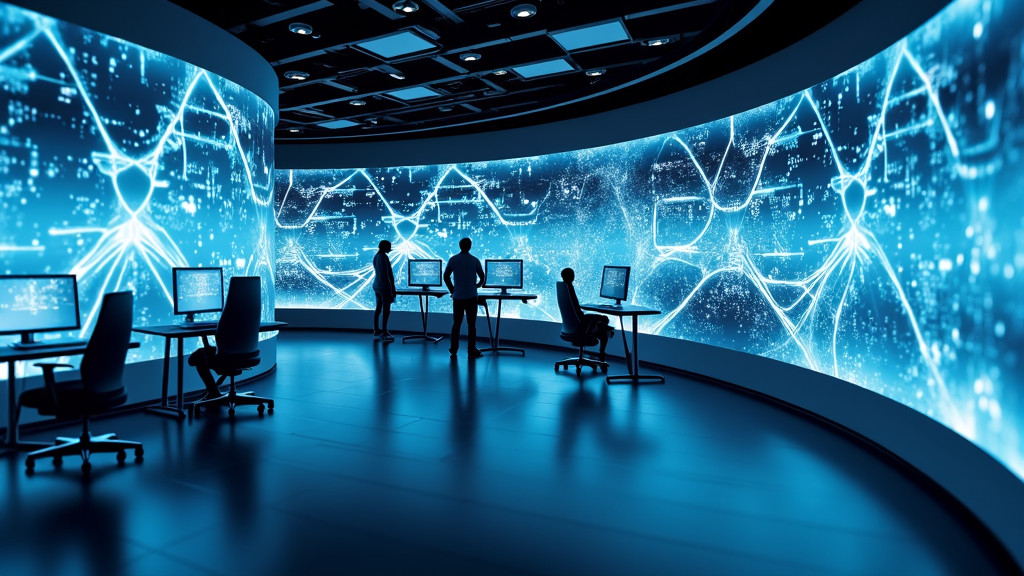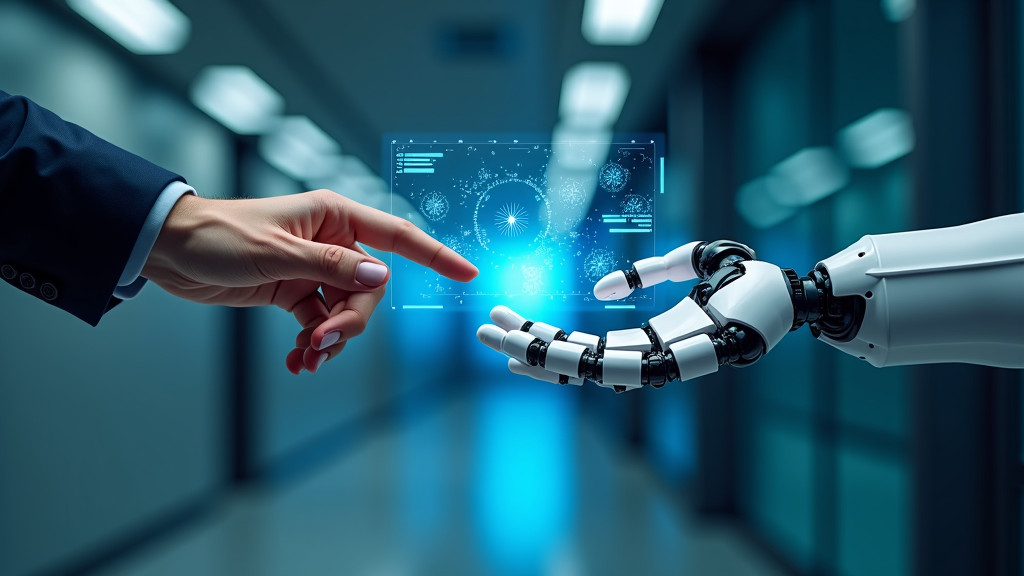Shaping Tomorrow: The Future of AI Software Development
The fusion of artificial intelligence and software development is ushering in a new era of innovation and efficiency. AI is rapidly transforming how applications are designed, built, and maintained, enhancing the entire development lifecycle. By harnessing automation and machine learning, AI is dramatically boosting productivity and accuracy in ways previously unimaginable.
AI software development uses intelligent algorithms to streamline repetitive tasks, allowing developers to focus on more complex and creative work. Code generation tools powered by natural language processing can produce boilerplate code in seconds, speeding up development timelines. AI-driven testing and debugging systems catch errors with superhuman precision, significantly improving software quality and reliability.
Importantly, AI is augmenting human capabilities rather than replacing them. As industry experts note, the synergy between human ingenuity and AI efficiency is leading to more innovative, robust, and user-centric applications. This partnership promises to push the boundaries of what’s possible in software, opening new frontiers in personalization, performance, and problem-solving.
Automation in Code Generation
Imagine a tool that turns your ideas into working code. AI-powered code generation is making this a reality for developers, transforming how software is built by speeding up the process significantly.
Automated code generation relies on artificial intelligence to convert instructions into functional code. It’s like having an intelligent assistant that understands your goals and writes the code for you, adaptable to various programming languages.
One of the main advantages of this approach is the substantial time savings it provides. Developers can focus on the overall project, leaving the AI to handle the details. This accelerates project completion, allowing developers to address more complex challenges.
Beyond speed, automated code generation helps minimize errors often made during manual coding. The AI assistant tends to avoid simple mistakes, resulting in cleaner, more reliable code, reducing the need for extensive debugging and testing.
For beginners or those learning a new language, AI code generation serves as a valuable resource. It’s like having an expert guide you, offering the best methods to write functions or solve common coding issues, enhancing the learning experience and building confidence.
Experienced coders also benefit from these AI tools, using them to generate boilerplate code or manage repetitive tasks, preserving mental energy for more creative aspects of development. It’s about enhancing human creativity, not replacing it.
As IBM notes, AI coding assistants are becoming more advanced, assisting with tasks like identifying security issues and optimizing performance, thus making development smoother and more efficient.
AI code generation is a tool that complements human developers. The creativity and problem-solving skills of experienced programmers remain essential. AI is here to assist, not replace.
As this technology progresses, we can expect even more impressive capabilities. The future of software development is becoming brighter and more efficient, thanks to AI-driven code generation, opening up possibilities once unimaginable.
Enhancing Predictive Analytics


AI-driven predictive analytics is transforming software development by enabling developers to anticipate user needs with remarkable accuracy. This integration of AI and data analysis is changing the approach to software creation, testing, and deployment.
Predictive analytics uses historical data to identify patterns and forecast trends. Enhanced by AI, these predictions become more nuanced. For example, McKinsey reports that companies using AI-powered analytics see revenue increases of up to 15% and sales ROI improvements of up to 20%.
Developers benefit by anticipating user behavior before coding starts. By analyzing past user interactions, AI predicts which features will be most valuable, allowing developers to prioritize effectively. This streamlines development and ensures the final product aligns with user expectations.
Forecasting User Needs
AI-driven predictive analytics excels at forecasting user needs. By examining historical user data, AI algorithms identify trends and predict future requirements, enabling developers to build features users will need in the future.
For example, a mobile app team might use analytics to anticipate which app features will be in demand, informing decisions about functionalities to prioritize in updates. This ensures efficient and effective resource allocation.
Optimizing User Experience
Predictive analytics also optimizes feature implementation. By analyzing user data, AI predicts navigation patterns, allowing developers to create intuitive interfaces and streamline user journeys for a better experience.
For instance, if analytics show users struggle to find a feature, developers can redesign the interface to improve accessibility, solving problems before they arise.
Enhancing Testing and Quality Assurance
Predictive analytics is revolutionizing software testing. By analyzing bug reports and feedback, AI predicts potential issues in new code, allowing developers to address problems early, reducing debugging time and resources.
It also helps prioritize testing by identifying areas likely to experience issues, ensuring critical functionalities receive necessary attention and enhancing software reliability.
The future of software development lies in anticipation, not reaction. AI-powered predictive analytics is the crystal ball every developer needs.
John Doe, Software Architect
Looking ahead, AI-driven predictive analytics will become increasingly vital in software development. By providing insights into trends and forecasting scenarios, it enables the creation of software that meets current needs and anticipates future requirements. In an industry where staying ahead is crucial, predictive analytics is an indispensable ally for developers.
Improving User Experience with AI
Artificial intelligence is transforming how we interact with technology, creating more intuitive and personalized experiences for users. AI allows developers to craft software applications that adapt to individual preferences and behaviors, making the digital environment more user-friendly.
AI enhances user experience through personalization. Imagine opening your favorite shopping app and seeing product recommendations that align perfectly with your preferences. AI analyzes past purchases, browsing history, and contextual factors like time of day or weather to curate a personalized shopping experience.
Personalization extends beyond product recommendations. AI-powered chatbots and virtual assistants offer personalized support that feels human. These AI agents understand natural language, remember past interactions, and detect emotional cues, providing empathetic and relevant responses.
The Power of Behavior Analysis
AI’s ability to enhance user experience lies in its behavior analysis prowess. By processing vast amounts of user data, AI identifies patterns and trends invisible to the human eye. This deep understanding allows developers to refine and optimize applications continually.
A recent study by McKinsey found that companies using AI for personalization saw a 40% increase in conversion rates on average. This isn’t just about boosting sales; it’s about creating experiences that resonate with users.
| Company | Strategy | Impact on Conversion Rates |
|---|---|---|
| Amazon | AI-powered recommendation engine | 35% of annual sales |
| Starbucks | Personalized emails based on past purchases | 3x increase in customer spending |
| Sephora | AI-powered virtual assistant for product recommendations | 11% boost in conversions |
| North Face | AI-driven personalization and predictive analytics | 60% increase in click-through rates |
AI’s behavior analysis capabilities also predict user needs before they arise. Imagine a fitness app that not only tracks workouts but also anticipates when you might fall off your routine, sending motivational messages to keep you on track. This proactive approach can increase engagement and satisfaction.
Enhancing Interactions Through AI
AI is transforming user interactions with software applications. Voice recognition and natural language processing make interactions intuitive, allowing users to communicate with devices naturally.
AI also enables more accessible experiences for users with disabilities. From real-time captioning for the hearing impaired to describing images for the visually impaired, AI breaks down barriers and makes technology more inclusive.
The potential for AI to enhance user experience is vast. From predictive interfaces that anticipate our needs to emotionally intelligent systems that respond to our moods, AI is set to make digital interactions more seamless and enjoyable.
While AI’s technical aspects can be complex, its impact on user experience is simple: it’s about making technology work better for people. As AI evolves, we can look forward to digital experiences that are not just functional but truly delightful.
The Future of AI in Software Development


AI integration in software development holds immense promise, likely reshaping how we build and deploy software. AI’s potential to minimize human intervention in routine coding tasks is one of the most exciting prospects. As machine learning models grow more sophisticated, they can handle increasingly complex programming challenges with minimal oversight, freeing developers to focus on higher-level problem-solving and innovation.
AI-powered tools are already speeding up coding, testing, and deployment processes. As these technologies evolve, we can expect even greater gains in productivity and faster time-to-market for new software products.
Beyond automation, AI will serve as a collaborative partner to human developers, offering intelligent suggestions, spotting potential issues before they arise, and contributing novel solutions to coding problems.
However, the human element remains irreplaceable. The creativity, strategic thinking, and ethical considerations that human developers bring will be crucial in guiding AI’s integration and ensuring it serves the needs of users and society.
The future of AI in software development is one of symbiosis—humans and machines working together to push technological boundaries. As this landscape evolves, adaptability and continuous learning will be key for developers and organizations. Those who embrace AI’s potential while honing their uniquely human skills will thrive in tomorrow’s software development landscape.
Last updated:
Disclaimer: The information presented in this article is for general informational purposes only and is provided as is. While we strive to keep the content up-to-date and accurate, we make no representations or warranties of any kind, express or implied, about the completeness, accuracy, reliability, suitability, or availability of the information contained in this article.
Any reliance you place on such information is strictly at your own risk. We reserve the right to make additions, deletions, or modifications to the contents of this article at any time without prior notice.
In no event will we be liable for any loss or damage including without limitation, indirect or consequential loss or damage, or any loss or damage whatsoever arising from loss of data, profits, or any other loss not specified herein arising out of, or in connection with, the use of this article.
Despite our best efforts, this article may contain oversights, errors, or omissions. If you notice any inaccuracies or have concerns about the content, please report them through our content feedback form. Your input helps us maintain the quality and reliability of our information.